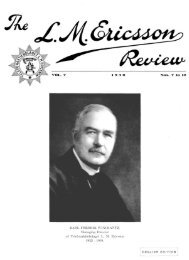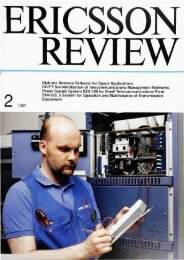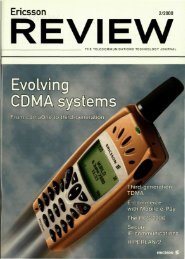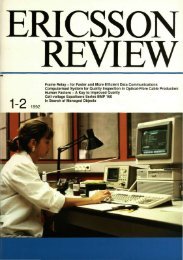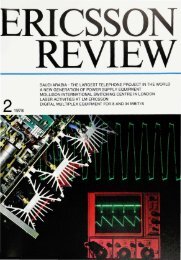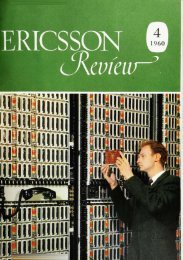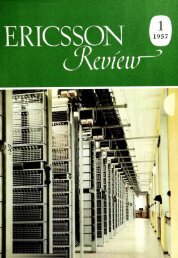ericsson review - ericssonhistory.com
ericsson review - ericssonhistory.com
ericsson review - ericssonhistory.com
Create successful ePaper yourself
Turn your PDF publications into a flip-book with our unique Google optimized e-Paper software.
Do the Media Understand<br />
Tele<strong>com</strong>munications<br />
Christopher Lorenz<br />
ERICSSON REVIEW plans to publish from time to time articles of a general interest<br />
in the field of <strong>com</strong>munications.<br />
The second article in this new series has been written by CHRISTOPHER LORENZ<br />
of the Financial Times in London, who is one of the best respected tele<strong>com</strong>munications<br />
writers in the world press today.<br />
Mr. Lorenz discusses some of the problems of the "unknown" tele<strong>com</strong>munications<br />
industry and the lack of recognition for what this industry contributes. And<br />
suggests that one of the solutions might be education and information of mass<br />
media as a means of improving the general public's understanding of tele<strong>com</strong>munications.<br />
achieved high levels of telephone penetration,<br />
and are trying to improve the<br />
usage of their installed assets.<br />
Greater understanding from the public<br />
can also help the organisation in other<br />
ways, such as reducing the barrage of<br />
impatience and <strong>com</strong>plaint when something<br />
goes wrong. This applies as much<br />
to the occasional breakdown as to the<br />
impact of changing levels of telephone<br />
network investment on employment in<br />
the factories which make tele<strong>com</strong>munications<br />
equipment.<br />
UDC 654.1:<br />
659.3<br />
Many a tele<strong>com</strong>munications professional<br />
has asked me over the years why his<br />
industry is so poorly understood by the<br />
general public, as <strong>com</strong>pared with motor<br />
vehicles or shipbuilding-or even<br />
more "difficult" subjects such as<br />
nuclear power, genetic engineering or<br />
astro-physics. After all, he usually argues,<br />
tele<strong>com</strong>munications is of prime<br />
social and economic importance.<br />
A mass of factors supports his argument:<br />
efficient telephone and data networks<br />
are vital to the very life of a modern<br />
industrialised economy; operation<br />
of the systems and their manufacture<br />
together employ several hundred thousand<br />
people in each of many countries<br />
round the world; massive annual investment<br />
in the business is required (often<br />
running into several billions of dollars);<br />
taken together with associated activities<br />
like <strong>com</strong>puting and electronic <strong>com</strong>ponents,<br />
tele<strong>com</strong>munications will account<br />
for more than six per cent of several<br />
gross national products in Europe by<br />
the early 1980s; and on the question of<br />
technological innovation, the tele<strong>com</strong>s<br />
man will argue that current advances in<br />
both switching and transmission are as<br />
exciting as anything the motor industry<br />
or even nuclear power have to offer.<br />
This concern with the need for greater<br />
public understanding is not just a question<br />
of giving the tele<strong>com</strong>s professional<br />
the widespread recognition he deserves,<br />
alongside the designer of cars, or<br />
nuclear physicist. In almost every country,<br />
greater public awareness could promote<br />
demand for all sorts of telephone<br />
services —an important economic factor<br />
to countries which are now installing<br />
extensive networks for the first time,<br />
just as it is for those which have already<br />
If administrations and manufacturers<br />
are to get their message across, they<br />
will first have to persuade the media<br />
(both press and broadcasting) that they<br />
are in an interesting business. This will<br />
be<strong>com</strong>e harder in the next few years, as<br />
more and more equipment is <strong>com</strong>pressed<br />
into obscure small boxes of integrated<br />
circuits controlled by <strong>com</strong>puter<br />
tapes and discs. Even with traditional<br />
technology, it is not an easy task.<br />
From a journalistic point of view, the<br />
most obvious problem about the telephone<br />
is that, in many countries, people<br />
perceive it as "just part of the furniture".<br />
It has been around for so long that it<br />
has ceased to be an interesting object<br />
for many people —unless it breaks<br />
down, that is.<br />
In the United States, to some extent,<br />
the telephone has been given a new<br />
lease of life as an object of public interest<br />
by the advent of <strong>com</strong>petition since<br />
1968 in parts of the tele<strong>com</strong>munications<br />
market. People's interest can hardly fail<br />
to be aroused when they are assaulted<br />
daily by the <strong>com</strong>peting claims of various<br />
suppliers, and when their local shopping<br />
plaza contains at least one "Phone<br />
Mart" with a bewildering array of handsets<br />
in over a dozen colours. The <strong>com</strong>petitive<br />
climate and the general public<br />
awareness it creates, stimulates the media<br />
to give tele<strong>com</strong>munications considerable<br />
"coverage".<br />
In Europe, by contrast, the media still<br />
generally turns its attention to tele<strong>com</strong>munications<br />
only when it is the subject<br />
of a major row, be this over the threatened<br />
admission or nationalisation of<br />
new suppliers (as in France and the<br />
United Kingdom in recent years), or the



